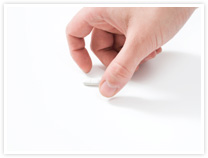Home >> Disorders >> Swallowing
 We've all experienced difficulty with our swallowing. Perhaps our timing was off and "something went down the wrong way". Or we tried to swallow a piece of food that was too big and had trouble getting it down. Our bodies are equipped to manage an occasional episode of food not swallowed effectively. However, when people experience consistent episodes or the situation becomes health threatening that is called
dysphagia.
We've all experienced difficulty with our swallowing. Perhaps our timing was off and "something went down the wrong way". Or we tried to swallow a piece of food that was too big and had trouble getting it down. Our bodies are equipped to manage an occasional episode of food not swallowed effectively. However, when people experience consistent episodes or the situation becomes health threatening that is called
dysphagia. Besides being unpleasant, swallowing disorders can have a negative effect on overall health and well-being. A person with dysphagia can choke while eating or drinking, and he or she may aspirate - or breathe in - food and liquid, which can lead to a potentially serious pneumonia. People who can't swallow properly are also more likely to become underweight and malnourished, and they often become embarrassed or anxious about eating, which can lead to social isolation and depression.
SYMPTOMS
There are many observable indicators of a swallowing disorder. These include:
- You have trouble initiating or starting to swallow once food or liquid is in your mouth.
- Once you swallow, it often feels as if the food has stuck in your throat or chest.
- You cough or choke frequently during eating.
- Your voice has developed a wet or "gurgling" quality, and you clear your throat often, especially while eating.
- After eating you often regurgitate or bring up bits of food.
- You often experience heartburn or a bitter taste in your mouth.
Until recently many experts thought the ability to swallow deteriorated naturally with age. But newer research suggests that age alone doesn't impair swallowing enough to cause dysphagia - although many medical problems and other conditions that affect swallowing do tend to occur later in life.Some people have swallowing problems that originate in the upper end of the food passage - the mouth and throat. The most common cause of this type of dysphagiain adults is stroke: Research shows that up to 45 per cent of stroke sufferers exhibitearly signs of a swallowing disorder, although most recover their ability to swallow normally after a few weeks. Other causes are traumatic brain injury after an accident or fall, degenerative neuromuscular diseases such as Parkinson's Disease, oramyotrophic lateral sclerosis (Lou Gehrig's disease).
References:
Canadian Association of Speech-Language Pathologists and Audiologists (CASLPA)




